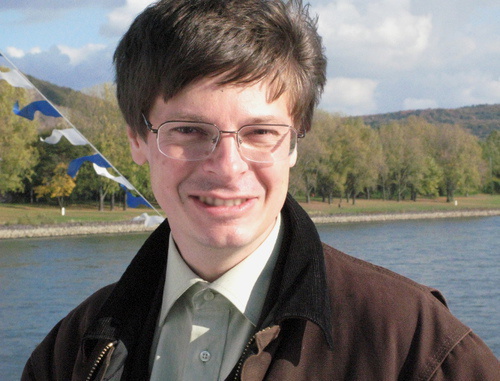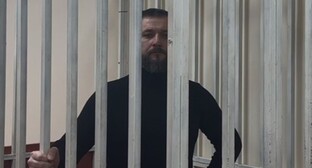
21 May 2014, 13:30
Vladimir Bobrovnikov: "Caucasian War was carried on with extreme cruelty of both parties"
On the eve of the anniversary of the end of the Caucasian War, Vladimir Bobrovnikov, a senior researcher at the Institute of Oriental Studies of the Russian Academy of Sciences (RAS), has answered the questions of the "Caucasian Knot", touching on a number of problematic aspects of the perception of the history of Caucasian Wars, politicization and mythologization of them.
Full transcript of this interview is available in Russian language at the ‘Caucasian Knot’ website
"Russian-Circassian" or "Caucasian"? War or Wars?
"Caucasian Knot" (CK): May 21, 2014 will be marked as the 150th anniversary of the end of the Caucasian War; however, the very term of "Caucasian War" is sometimes contested in public discourse. Sometimes, for example, they use the term of "Russian-Circassian War" or "Russian-Caucasian War". Which name do you find most acceptable?
Vladimir Bobrovnikov (VB): In literature, the term "Caucasian War" is used to describe a number of many-year-long and fierce military campaigns held between the highlanders of Northern Caucasus and Russia's troops, which resulted in the final incorporation of the region by the Russian Empire by the end of the second third of the 19th century. The very term "Caucasian War" is very conditional and quite officious. It was first introduced by the military publicist General R. A. Fadeev in his book "Sixty Years of Caucasian War", published in Tiflis in 1860. Now, the term "Caucasian War" is common, although even in the 1960s the term of "Caucasian Wars" was used. Indeed, the military actions in the Caucasus were not held continuously for all the 60 years, not even for a half or quarter of a century. Sometimes, quite long periods of peaceful coexistence happened between individual war episodes. Thus, it is more correct to talk about a series of Caucasian Wars. As regards the term of "Russian-Circassian War", it is almost never used in scientific literature. It is not very precise, since the war or wars was or were waged not so much by Russian and Circassians, but by the Russian Empire on the one hand and various political entities of Caucasian highlanders of different nationalities, on the other. Among the opponents of the tsarist Russia, the most prominent role in the history of the warfare was performed by the so-called "Imamate" – a state-like formation in the territory of the mountainous Dagestan and Chechnya, which arose as a result of an armed jihad held by local Muslims and supportive Muslim nobility against the Empire. For more than a quarter of a century, the Imamate was headed by a prominent politician and religious leader Shamil, who was, incidentally, not a Circassian, but an Avar, a native of Dagestan (from the village of Gimry).
CK: In Southern Russia, both Cossacks and Circassians, living side by side, keep quite different stories about the Caucasian War in their memory. In what way can some consensus be reached at this level?
VB: To avoid future conflicts and exacerbations based on different interpretation of historical events, in particular, those related to Caucasian Wars and the conquest of the region by the Russian Empire, politicians should, first of all, solve the present time problems. The Russian Caucasus (as, indeed, also the already non-Russian Transcaucasia) has plenty of them. They include the economic crisis with its corruption and need of donations from the federal centre; consequences of the two Chechen Wars; terrorism and criminality; and, besides, migrants, youth and the school. Historians should not, as it seems to me, play in tune with politicians (serving them for certain benefits and handouts), helping them to forget these and highlight other facts from the uneasy imperial and more recent past of the Caucasus.
CK: On the eve of the Sochi Olympics especially a lot was spoken in the Caucasus about the so-called "Circassian issue" and the need to recognize the Circassian genocide. How justified is, in your opinion, this form of political demands?
VB: The Circassian issue is the issue of the historical memory in descendants of the Circassian Diaspora – the descendants of Mukhajirs (emigrants) originated from the Caucasus and now living in the Middle East, and elsewhere in the world. The historical memory of these Diasporas is really extremely traumatized by mass deportations and related victims. Of course, Russian militaries had treated Circassians very cruelly by forbidding them after the conquering of the region to live in the mountains and forcing them to leave their homeland. The resettlement was badly organized; and many people failed to withstand the burden and died from diseases and starvation. The advocates of evicting Circassians from the Russian Caucasus from among the Russian militaries, who ruled the Northwest Caucasus in the middle of the 19th century, knew about it, but failed to help the Circassians, although imagined themselves to be very humane and philanthropic persons. Moreover, the words of the then Russian Caucasian viceroy Baryatinskiy are broadly known, who expressed, very clearly but sharply, the viewpoint of the leadership of the Russian Empire about the Circassians, who tried to leave the Caucasus under the guise of pilgrims committing Hajji: "You know what? It is, perhaps, not bad that all these bastards are leaving, taking off the burden from us. Do not stop them; let them go to Mecca, or wherever they want." Along with that, this viewpoint was shared by other Europeans who lived in the epoch of colonial empires.
However, in my opinion, the definition of the eviction of Mukhajirs as genocide is not quite correct and too heavily loaded with unnecessary political connotations. Besides, this term leads to excessive victimization of the Circassian history, which is already extremely mythologized without it. Being not a lawyer, I cannot judge on the political justification of using the term of "genocide".
CK: In your opinion, is it possible to "remove" the Circassian issue without recognizing the genocide?
VB: I have no recipe how to do it. In assessing the Circassian issue, it is impossible to silence the huge sacrifices made by highlanders during their resettlement from the Caucasus to the Ottoman Empire. However, we should not forget other victims of Caucasian Wars. The authors who wrote about the mass evictions conducted in the post-war Northern Caucasus, as a rule, resorted to colourful descriptions of highlanders' sufferings. But the Cossacks, who were moved to their former lands found themselves in no better situation. The available sources indicate that the Caucasian War was waged with terrible atrocities on both and for both parties – resettling and burning down of unruly villages were applied not only by tsarist generals, but Shamil as well.
Vladimir Bobrovnikov was interviewed by Semyon Charny, the "Caucasian Knot" correspondent.
May 19, 2014





Комментирование через Кавказский узел